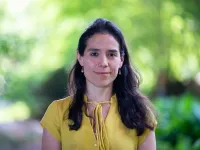(Press-News.org) First-of-its-kind research by Tarang Parekh, assistant professor of epidemiology, reviewed the State Innovation Models (SIM), a payment system introduced by the Centers for Medicare and Medicaid Services in 2013, which provides financial incentives to states to develop innovative payment models to improve healthcare systems.
In the study, recently published in the American Journal of Epidemiology, Parekh compared data from 2010 to 2015 from three SIM participating states, Arkansas, Massachusetts and Vermont, to Florida, Nebraska and New Mexico, which do not participate in SIM. He studied the effects of capturing social risk factors in adults hospitalized with atherosclerotic cardiovascular disease (ASCVD).
His research identified small but statistically significant improvements in capturing social determinants of health using Internal Classification of Diseases (ICD) codes, particularly among Medicare enrollees with ASCVD. This is important to improving health outcomes because while clinical care is important, more than 80% of the factors associated with being healthy are from social determinants of health like housing, education and the environment. To more effectively address these factors, improvements are needed in how they are quantified through systems like this that capture social risk factors more broadly.
“Currently, we try to address social determinants of health, but we are focused on very selective populations and regions, and different systems are asking about topics like food insecurity in different ways, so the severity of the social determinant is unclear,” said Parekh. “A standardized collection method using ICD codes to capture social determinants of health will help us better understand the population we need to target. We'll also learn whether a specific condition is more heavily influenced by social determinants of health, allowing us to target those factors more effectively."
END
Study shows SIM models improve health data
Breakthrough research reveals impact of payment models on capturing social determinants of health for Medicare enrollees
2024-09-17
ELSE PRESS RELEASES FROM THIS DATE:
Study suggests humor could help people engage with colorectal cancer information
2024-09-17
BUFFALO, N.Y. – Colorectal cancer (CRC) is no laughing matter. It’s the second-leading cause of cancer deaths globally, according to the World Health Organization. But new research led by the University at Buffalo suggests that humor can be an effective mechanism for reaching people who otherwise avoid information about colorectal cancer screening or other health messaging.
The research, published online ahead of print in the British Journal of Health Psychology, found that in people who demonstrated a ...
Q&A: Ethical decision-making around neurotechnology treatments
2024-09-17
UNIVERSITY PARK, Pa. — A novel neurotechnology treatment known as deep brain stimulation (DBS) can benefit patients with neurological disorders, but it involves surgical procedures with potential risks. Assessing the risk-benefit tradeoffs and the ethics in making decisions about whether to begin such treatments and when can be tricky for both patients and clinicians.
Laura Cabrera, associate professor of engineering science and mechanics, received a four-year, $1.5 million grant from the National Institutes of Health to research and develop ...
A smoother way to study ‘twistronics’
2024-09-17
A discovery six years ago took the condensed-matter physics world by storm: Ultra-thin carbon stacked in two slightly askew layers became a superconductor, and changing the twist angle between layers could toggle their electrical properties. The landmark 2018 paper describing “magic-angle graphene superlattices” launched a new field called “twistronics,” and the first author was then-MIT graduate student and recent Harvard Junior Fellow Yuan Cao.
Together with Harvard physicists Amir ...
UT Health San Antonio finds genetic risk-factor overlap between Alzheimer’s disease, and all-cause and vascular dementias
2024-09-17
SAN ANTONIO, Sept. 17, 2024 – In landmark research, scientists at The University of Texas Health Science Center at San Antonio (UT Health San Antonio) have reported the largest-ever genome-wide association study of dementia from all causes, revealing an overlap of genetic risks including neurodegeneration, vascular factors and cerebral small-vessel disease.
Genome-wide association studies help scientists identify genes associated with a particular disease or trait by exploring the entire set of DNA, or genome, of a ...
UM School of Medicine aims to accelerate basic science research and advance drug therapies with newly-created department
2024-09-17
University of Maryland School of Medicine (UMSOM) Dean Mark T. Gladwin, MD, has announced the formation of a new Department of Pharmacology, Physiology and Drug Development, which merges the Department of Physiology and Department of Pharmacology. This new Department aligns the basic science research efforts of both entities with a strong emphasis on the development of new drug therapies.
The Department will host three divisions spanning Cancer Therapeutics, Molecular Physiology, and Neuropharmacology, creating additional opportunities for research partnerships across current UMSOM Centers, ...
Can Google street view data improve public health?
2024-09-17
Big data and artificial intelligence are transforming how we think about health, from detecting diseases and spotting patterns to predicting outcomes and speeding up response times.
In a new study analyzing two million Google Street View images from New York City streets, a team of New York University researchers evaluated the utility of this digital data in informing public health decision-making. Their findings, published in the Proceedings of the National Academy of Sciences (PNAS), show how relying on street view images alone may lead ...
Mapping out matter’s building blocks in 3D
2024-09-17
NEWPORT NEWS, VA – Deep inside what we perceive as solid matter, the landscape is anything but stationary. The interior of the building blocks of the atom’s nucleus — particles called hadrons that a high school student would recognize as protons and neutrons — are made up of a seething mixture of interacting quarks and gluons, known collectively as partons.
A group of physicists has now come together to map out these partons and disentangle how they interact to form hadrons. Based at the U.S. Department of Energy’s Thomas Jefferson National Accelerator Facility and known as the HadStruc Collaboration, these ...
Cancer patients want financial screening early in care, study finds
2024-09-17
Patients want providers to reach out early and often to ask about financial needs
First study seeking cancer patient input on how they want to be screened
Findings show how to best deploy policies to screen cancer patients for financial concerns
CHICAGO --- Patients with cancer want their care team to assess them early in treatment about their concerns related to costs of care, reports a Northwestern Medicine study. It is the first time a study has sought cancer patients’ input on how they want to be screened for financial needs.
The financial impact of treatment, referred to as financial toxicity, includes direct costs, such as how much ...
Black women have a higher risk of dying from all types of breast cancer, meta-analysis reveals
2024-09-17
Breast cancer is the most diagnosed cancer among U.S. women and the second leading cause of cancer death. Black women who develop breast cancer are around 40% more likely to die of the disease than white women, but it was unclear until now whether this disparity exists across all types of breast cancer. Now, a meta-analysis led by Mass General Brigham researchers shows that Black women have a higher risk of dying from breast cancer for all tumor subtypes, and the size of this disparity varies from 17-50% depending on the type of breast cancer.
These findings, ...
‘Good complexity’ can make hospital networks more cybersecure
2024-09-17
In May, a major cyberattack disabled clinical operations for nearly a month at Ascension, a health care provider that includes 140 hospitals across the U.S. Investigators tracked the problem to malicious ransomware that had infected an employee’s computer.
Health care systems offer juicy targets for cybercrime because of the valuable personal, financial, and health data they hold. A 2023 survey of health information technology and IT security professionals reported that 88% of ...
LAST 30 PRESS RELEASES:
Exercise and nutritional drinks can reduce the need for care in dementia
Michelson Medical Research Foundation awards $750,000 to rising immunology leaders
SfN announces Early Career Policy Ambassadors Class of 2026
Spiritual practices strongly associated with reduced risk for hazardous alcohol and drug use
Novel vaccine protects against C. diff disease and recurrence
An “electrical” circadian clock balances growth between shoots and roots
Largest study of rare skin cancer in Mexican patients shows its more complex than previously thought
Colonists dredged away Sydney’s natural oyster reefs. Now science knows how best to restore them.
Joint and independent associations of gestational diabetes and depression with childhood obesity
Spirituality and harmful or hazardous alcohol and other drug use
New plastic material could solve energy storage challenge, researchers report
Mapping protein production in brain cells yields new insights for brain disease
Exposing a hidden anchor for HIV replication
Can Europe be climate-neutral by 2050? New monitor tracks the pace of the energy transition
Major heart attack study reveals ‘survival paradox’: Frail men at higher risk of death than women despite better treatment
Medicare patients get different stroke care depending on plan, analysis reveals
Polyploidy-induced senescence may drive aging, tissue repair, and cancer risk
Study shows that treating patients with lifestyle medicine may help reduce clinician burnout
Experimental and numerical framework for acoustic streaming prediction in mid-air phased arrays
Ancestral motif enables broad DNA binding by NIN, a master regulator of rhizobial symbiosis
Macrophage immune cells need constant reminders to retain memories of prior infections
Ultra-endurance running may accelerate aging and breakdown of red blood cells
Ancient mind-body practice proven to lower blood pressure in clinical trial
SwRI to create advanced Product Lifecycle Management system for the Air Force
Natural selection operates on multiple levels, comprehensive review of scientific studies shows
Developing a national research program on liquid metals for fusion
AI-powered ECG could help guide lifelong heart monitoring for patients with repaired tetralogy of fallot
Global shark bites return to average in 2025, with a smaller proportion in the United States
Millions are unaware of heart risks that don’t start in the heart
What freezing plants in blocks of ice can tell us about the future of Svalbard’s plant communities
[Press-News.org] Study shows SIM models improve health dataBreakthrough research reveals impact of payment models on capturing social determinants of health for Medicare enrollees


